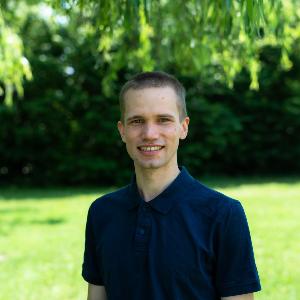Dr. Vitaly Wirthl
Alumni Portrait
Alumni Portrait

"The diversity of the phenomena of nature is so great, and the treasures hidden in the heavens so rich, precisely in order that the human mind shall never be lacking in fresh nourishment. (J. Kepler, Mysterium Cosmographicum)"
I was interested in the fundamental questions and wanted to understand the laws of nature “down to the core”. I was particularly fascinated by how comprehensively the universe can be described in cosmology or particle physics, for example. I also had a philosophical interest in fundamental questions: I remember being fascinated by W. Heisenberg's lectures and books on physics and philosophy in my last school classes. In one lecture, Heisenberg argued that modern physics is more likely to agree with Plato than Democritus on the question of the structure of matter: according to the findings of quantum field theory, matter consists of "intangible" mathematical structures, as Plato thought, than of "tangible" indivisible objects, as Democritus thought. I found that very exciting, because in the 19th century people were convinced that Democritus was right - matter seemed to consist of indivisible atoms!
I am very grateful that I was able to pursue my interest in fundamental physics during my PhD in the Laser Spectroscopy Department at the Max Planck Institute of Quantum Optics. I worked on the precision spectroscopy experiment of hydrogen. Due to the simplicity of hydrogen, the energy levels can be accurately calculated using the theory of quantum electrodynamics (QED). Experimental techniques such as ultrastable lasers and the frequency comb, for which Prof. T. W. Hänsch was awarded the Nobel Prize in 2005, make it possible to precisely measure the transitions between different energy levels in order to compare theory and experiment with relative accuracy on the order of 10-12.
QED forms the basis of all other quantum field theories on which the standard model of particle physics is built. Currently, the situation of fundamental physics is very exciting because it is obvious that our fundamental understanding of nature is incomplete: the Standard Model of particle physics describes only about 5% of the total energy-matter content of the universe - the "visible matter", e.g. protons, neutrons and electrons, which make up atoms and molecules. So we do not yet know what 95% of our universe is made of! This mystery of so-called "dark matter" and "dark energy" could be linked to previously unknown natural laws. The increasingly precise test of QED could lead us to the trail of this "new physics". In fact, there are currently signs of discrepancies in the QED test, and future measurements will show whether these discrepancies point to previously undiscovered theory terms or disappear again within the statistical fluctuation.
In my dissertation, I investigated the precision laser spectroscopy of a previously unmeasured 2S-6P transition in heavy hydrogen (deuterium). Compared to ordinary hydrogen, precision spectroscopy of heavy hydrogen is interesting because far fewer transitions have been measured precisely and this atom has a composite nucleus.
As I really like it at the MPQ and the precision experiments usually last longer than a doctorate, I am happy to be able to stay on as a post-doc on the hydrogen experiments. I also have a few publications coming out of my doctorate that are due to be published. I am also looking forward to participating in teaching at the LMU.
In general, I think it's great to be able to work in research because it never gets boring and you're constantly learning new things. I find working on an atomic physics experiment exciting because it combines different techniques: lasers and optics, electronics, cryostats, microwaves, etc. I particularly like it when all these complex systems work at the same time, as you imagined they would, and you can actually measure something that nobody has measured before! I am also always happy to give lab tours to share my enthusiasm for fundamental physics in general and precision spectroscopy in particular.
During my master's degree, I worked as a student assistant in the hydrogen spectroscopy group at the MPQ, where I then did my doctorate. During this time, I was particularly impressed by the great group atmosphere and the enthusiasm for physics that our group leader Prof. Thomas Udem exudes. I also heard a lecture by Prof. T. W. Hänsch entitled "Passion for Precision" that really inspired me. I was also influenced by my year abroad in the USA, where I worked on a precision experiment to measure the electric dipole moment of the electron for my Master's thesis.
If you have the opportunity, you should do what really interests you in your heart, and not pay so much attention to which research field opens up "good career options". I would also advise you not to be so easily discouraged if you don't understand something or if something doesn't work for months in the lab - such times are part of studying and research. Try to keep at it as best you can and keep going - the greater the joy when you understand it or when the experiment actually works!